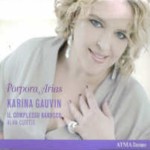Nicola Porpora (1686-1768) was a Neapolitan composer who penned more than 50 operas. He was as well known for being the voice teacher of one of the greatest singers of the time (and arguably the finest castrato), Farinelli, and also of Cafarelli, who was considered to be almost in the same league. Haydn was his apprentice; Metastasio was his frequent librettist. His operas are ideal examples of high Baroque, complete with absurdities and extraordinarily decorated vocal lines. He may not have been a “great” composer, but he was no slouch either; his operas were the toast of London, Vienna, Venice, and Naples, and the anti-Handel faction in London had its money on him to overthrow Handel. It didn’t work. (Both men wrote Arianna operas, Imeneo operas, and Orlando operas.)
Porpora was Kapellmeister in Dresden, but the introduction of Hasse and his wife, Faustina, ended that position. In the 1750s, he taught Haydn in Vienna. Though his arias tend to have a generic similarity to each other, his orchestration can be splendid–just listen to those trumpets on the second track of this CD, “Non sempre invendicata”; to the pair of flutes that accompany Galatea’s lament from Polifemo, track 5; or to the spicy oboes for Arianna’s aria, track 13. And for those who love florid vocal writing, Porpora’s about as satisfying as a Baroque composer can get.
Canadian soprano Karina Gauvin has been sneaking to the forefront of music-lovers’ consciousness for a while–a little Samuel Barber here, some Canteloube there, a bit of Mozart and Mahler. Then comes a disc of French Baroque music, a Handel disc, and suddenly the role of Morgana in an all-star Alcina (Archiv)–and she is a singer you look forward to. If the repertoire weren’t so rarefied, this CD would push her over the edge into true stardom.
Her voice is both bright and warm; a true soprano, the middle of her voice has sufficient body so that no emphases may be lost. Her trill is the real thing. She has taste–her embellishments are impeccably timed and tuned and it’s clear she could show off more if she chose to. She sounds Italian in this music, with fine use of portamento in the many slow numbers, plenty of temperament for the outbursts (“Poor me!” or “Vengeance!” or “You coward!”). There’s nothing “white” or early-music about her delivery. She’s probably not a high-note queen; if she has high Cs, Ds, etc., her voice probably would not be as evenly produced as it is.
As mentioned, the music may not be a collection of masterpieces, but it gives immense pleasure; Porpora, to give the devil his absolute due, knew how to write for the voice, and Gauvin has quite the voice. Vivica Genaux, René Jacobs, and Cecilia Bartoli have recorded Porpora arias–this is a composer absolutely worth getting to know. A CD of his arias was recorded by a countertenor named Angelo Manzotti on the Tactus label; it is terrifyingly bad–run from it. This one, however, is highly recommended. [9/25/2009]
































